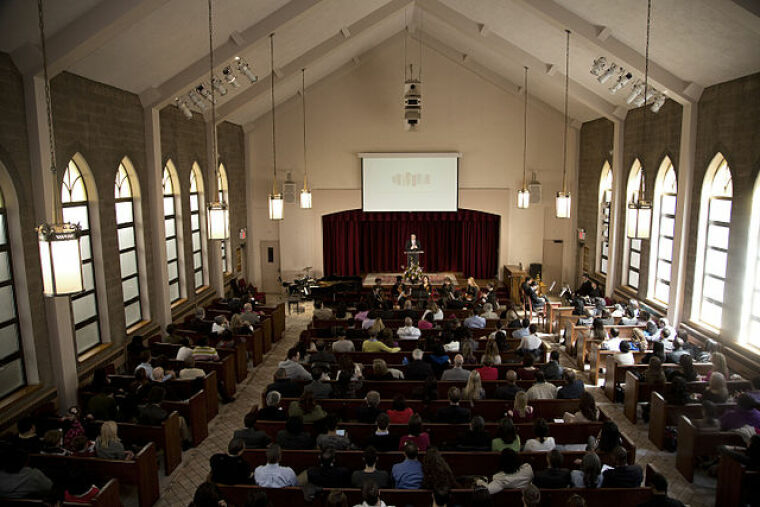Attending church can lead to longer life, new study claims

A recent study has claimed that those who attend religious services are more likely to have better health and live longer than those who do not.
The findings of a study conducted by Vanderbilt University professor Marino Bruce has shown that those who attend church or other places of worship may reduce their mortality risk by 55 percent, especially among those between the ages of 40 and 65.
Bruce, who is also a Baptist minister and the associate director of the school's Center for Research on Men's Health, used publicly available data from the National Health and Nutrition Examination Survey to track the worship attendance of 5,449 people.
The professor and his team looked at other variables such as socioeconomic status and health insurance coverage to build a statistical model to predict the risk of mortality.
The researchers also looked at the survey participants' allostatic load, which is a measurement of many factors, such as blood pressure, cholesterol levels, nutrition and metabolic health measures.
Bruce noted that those who do not attend church had significantly higher overall allostatic load scores, which is an indication of a high level of stress and a poor level of overall physical health.
"For those who did not attend church at all, they were twice as likely to die prematurely than those who did who attended church at some point over the last year," Bruce said, as reported by WTSP.
The study, titled "Church Attendance, Allostatic Load and Mortality in Middle Aged Adults," was published in the Plos One Journal on May 16. Bruce worked with nine co-authors, including Keith Norris, professor of medicine at the David Geffen School of Medicine at University of California, Los Angeles.
Although Bruce is a Baptist minister, he maintained that the research is not tied to any particular faith.
"I'm ordained clergy so I'm always about what do we mean by our spiritual health. Does spiritual health matter with respect to biological outcomes?" he said, according to The Christian Post.
"Any place of worship, any place where groups gather together to worship, it could be a church, it could be a temple, it could be a mosque... it's not about a particular faith," he went on to say.
The study further noted that people go to church for reasons beyond social support. Bruce said that he and his team also considered whether compassion is particularly important to the churchgoers.
Bruce said that he would also like to consider holiness and its effect on a person's health in the future. He argued that people eat better and take good care of themselves when they feel good about themselves.
 Christians don't have to affirm transgenderism, but they can’t express that view at work: tribunal
Christians don't have to affirm transgenderism, but they can’t express that view at work: tribunal Archaeology discovery: Medieval Christian prayer beads found on Holy Island
Archaeology discovery: Medieval Christian prayer beads found on Holy Island Presbyterian Church in America votes to leave National Association of Evangelicals
Presbyterian Church in America votes to leave National Association of Evangelicals Over 50 killed in 'vile and satanic' attack at Nigerian church on Pentecost Sunday
Over 50 killed in 'vile and satanic' attack at Nigerian church on Pentecost Sunday Ukrainian Orthodox Church severs ties with Moscow over Patriarch Kirill's support for Putin's war
Ukrainian Orthodox Church severs ties with Moscow over Patriarch Kirill's support for Putin's war Islamic State kills 20 Nigerian Christians as revenge for US airstrike
Islamic State kills 20 Nigerian Christians as revenge for US airstrike Man who served 33 years in prison for murder leads inmates to Christ
Man who served 33 years in prison for murder leads inmates to Christ


 Nigerian student beaten to death, body burned over ‘blasphemous’ WhatsApp message
Nigerian student beaten to death, body burned over ‘blasphemous’ WhatsApp message 'A new low': World reacts after Hong Kong arrests 90-year-old Cardinal Joseph Zen
'A new low': World reacts after Hong Kong arrests 90-year-old Cardinal Joseph Zen Iran sentences Christian man to 10 years in prison for hosting house church worship gathering
Iran sentences Christian man to 10 years in prison for hosting house church worship gathering French Guyana: Pastor shot dead, church set on fire after meeting delegation of Evangelicals
French Guyana: Pastor shot dead, church set on fire after meeting delegation of Evangelicals ‘Talking Jesus’ report finds only 6% of UK adults identify as practicing Christians
‘Talking Jesus’ report finds only 6% of UK adults identify as practicing Christians Mission Eurasia ministry center blown up in Ukraine, hundreds of Bibles destroyed: 'God will provide'
Mission Eurasia ministry center blown up in Ukraine, hundreds of Bibles destroyed: 'God will provide' Church holds service for first time after ISIS desecrated it 8 years ago
Church holds service for first time after ISIS desecrated it 8 years ago Burger King apologizes for 'offensive campaign' using Jesus' words at the Last Supper
Burger King apologizes for 'offensive campaign' using Jesus' words at the Last Supper Uganda: Muslims abduct teacher, burn him inside mosque for praying in Christ’s name
Uganda: Muslims abduct teacher, burn him inside mosque for praying in Christ’s name